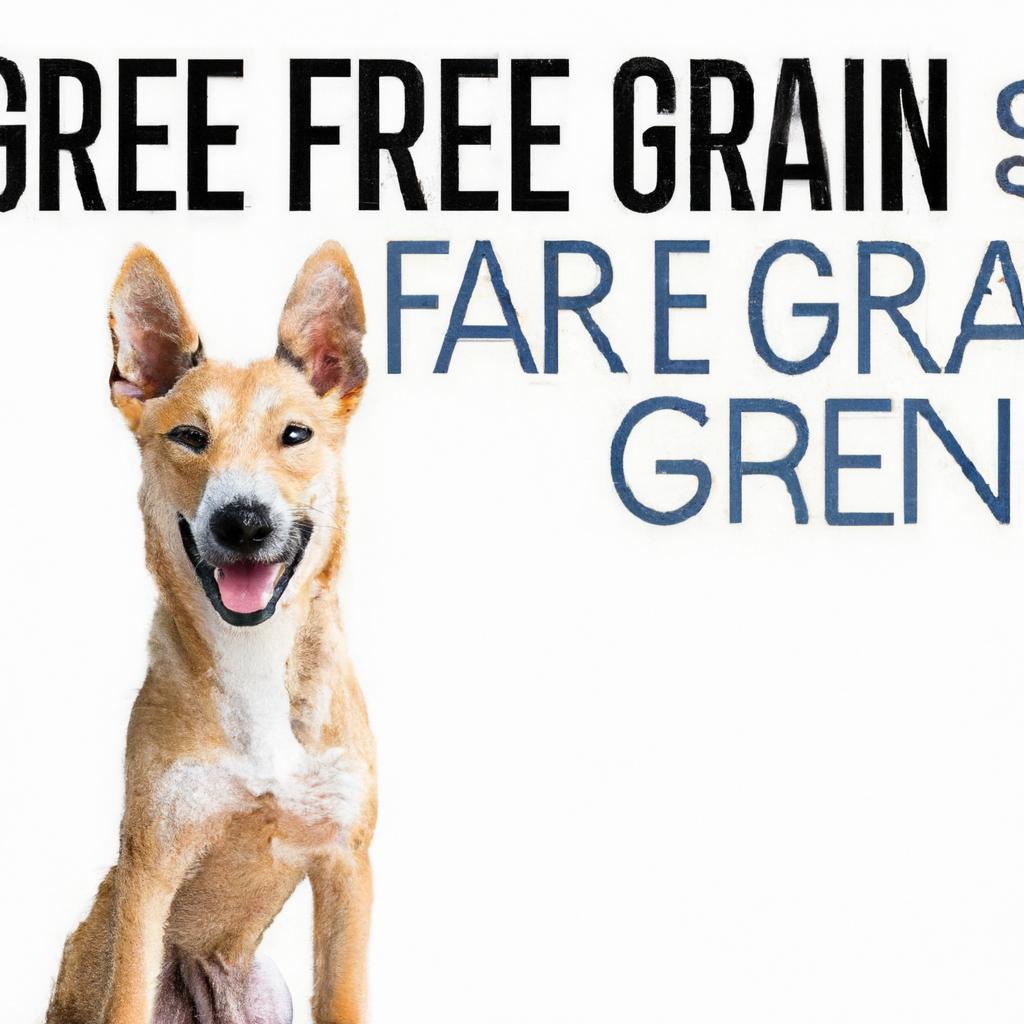In a quiet suburban neighborhood, a beloved golden retriever named Max began to show signs of lethargy and unusual coughing. His owner, Sarah, had recently switched him to a grain-free diet, believing it was healthier. However, after a visit to the vet, she learned that this diet could be linked to heart issues in dogs, particularly dilated cardiomyopathy. Max’s story serves as a cautionary tale: while grain-free diets may seem appealing, they can pose serious health risks. Always consult your vet before making dietary changes for your furry friend.
Contents
- Understanding the Link Between Grain-Free Diets and Canine Heart Health
- Identifying the Symptoms of Heart Issues in Dogs on Grain-Free Diets
- Evaluating the Nutritional Balance of Grain-Free Dog Foods
- Expert Recommendations for Choosing a Heart-Healthy Diet for Your Dog
- Q&A
Understanding the Link Between Grain-Free Diets and Canine Heart Health
In recent years, the debate surrounding grain-free diets for dogs has intensified, particularly concerning their potential impact on heart health. While many pet owners have embraced these diets, believing they offer a more natural and wholesome alternative, emerging research suggests a complex relationship between grain-free nutrition and canine cardiovascular conditions. Understanding this connection is crucial for dog owners who want to make informed dietary choices for their furry companions.
One of the primary concerns linked to grain-free diets is the increased risk of canine dilated cardiomyopathy (DCM), a serious heart condition that affects the heart muscle’s ability to pump blood effectively. Studies have indicated that certain grain-free formulations, particularly those high in peas, lentils, and potatoes, may be associated with a higher incidence of DCM in specific dog breeds. This correlation has prompted veterinarians and pet nutritionists to urge caution when selecting dog food, especially for breeds predisposed to heart issues.
Moreover, the nutritional balance of a dog’s diet plays a vital role in maintaining overall health. Grain-free diets can sometimes lack essential nutrients, such as taurine, an amino acid critical for heart function. While some dogs can synthesize taurine from other dietary components, others may require direct supplementation. Consequently, pet owners should be vigilant about ensuring their dogs receive a well-rounded diet that meets all their nutritional needs, regardless of whether it includes grains.
Ultimately, the decision to feed a grain-free diet should be made with careful consideration and consultation with a veterinarian. It is essential to evaluate the specific needs of your dog, taking into account factors such as breed, age, and existing health conditions. By prioritizing a balanced and nutritious diet, pet owners can help safeguard their dogs’ heart health while still catering to their dietary preferences.
Identifying the Symptoms of Heart Issues in Dogs on Grain-Free Diets
As pet owners, it is crucial to be vigilant about the health of our furry companions, especially when it comes to their diet. Dogs on grain-free diets may exhibit specific symptoms that could indicate underlying heart issues. Recognizing these signs early can make a significant difference in your dog’s health and well-being.
Some common symptoms to watch for include:
- Persistent Coughing: If your dog develops a chronic cough, it may be a sign of heart disease. This can occur due to fluid buildup in the lungs or pressure on the airways.
- Difficulty Breathing: Labored or rapid breathing, especially during rest or light activity, can indicate that your dog’s heart is struggling to function properly.
- Fatigue or Lethargy: If your dog seems unusually tired or reluctant to engage in activities they once enjoyed, it could be a warning sign of heart problems.
- Swollen Abdomen: An accumulation of fluid in the abdomen, known as ascites, can occur in dogs with heart issues, leading to noticeable swelling.
In addition to these physical symptoms, behavioral changes can also signal potential heart problems. Dogs may become more irritable or withdrawn, showing less interest in play or social interactions. Monitoring your dog’s behavior is just as important as observing their physical health, as changes in mood can often accompany underlying medical conditions.
Regular veterinary check-ups are essential for early detection of heart issues, especially for dogs on grain-free diets. Your veterinarian can perform diagnostic tests, such as echocardiograms or blood tests, to assess your dog’s heart health. Being proactive and attentive to your dog’s symptoms can lead to timely interventions, ensuring they lead a happy and healthy life.
Evaluating the Nutritional Balance of Grain-Free Dog Foods
When considering the nutritional balance of grain-free dog foods, it is essential to evaluate the ingredients that replace traditional grains. Many grain-free diets rely heavily on alternative carbohydrate sources such as potatoes, peas, and lentils. While these ingredients can provide energy, they may not always offer the same nutritional profile as whole grains. It’s crucial to ensure that these substitutes are not only digestible but also rich in essential nutrients that contribute to overall canine health.
Moreover, the protein content in grain-free dog foods often comes from animal sources, which can be beneficial for muscle development and maintenance. However, the quality and source of these proteins matter significantly. Look for foods that list high-quality protein sources, such as chicken, beef, or fish, as the primary ingredients. A balanced diet should also include a variety of protein sources to ensure that your dog receives a complete amino acid profile necessary for optimal health.
Another aspect to consider is the presence of added vitamins and minerals. Grain-free formulations sometimes lack certain nutrients that are naturally found in grains, such as B vitamins and fiber. Therefore, it is vital to choose products that are fortified with these essential nutrients to prevent deficiencies. Additionally, fiber plays a crucial role in digestive health, so ensuring that your dog’s diet includes adequate fiber from fruits and vegetables is paramount.
Lastly, the overall fat content in grain-free diets can vary significantly. While healthy fats are essential for energy and skin health, excessive fat can lead to weight gain and other health issues. It’s important to monitor your dog’s weight and adjust their food intake accordingly. Always consult with a veterinarian to determine the best dietary approach for your dog, especially if you are considering a grain-free diet. A well-rounded nutritional profile is key to maintaining your dog’s health and preventing potential issues, including those related to heart health.
Expert Recommendations for Choosing a Heart-Healthy Diet for Your Dog
When it comes to selecting a diet that promotes heart health for your dog, it’s essential to prioritize quality ingredients and balanced nutrition. Look for dog foods that are rich in **high-quality proteins**, such as chicken, beef, or fish, which provide essential amino acids necessary for maintaining muscle mass and overall health. Additionally, incorporating **omega-3 fatty acids** found in fish oil can help support cardiovascular function and reduce inflammation.
Another critical factor is the inclusion of **whole grains** or **fiber-rich vegetables** in your dog’s diet. Whole grains like brown rice or oats can provide a steady source of energy while also aiding in digestion. If you prefer a grain-free option, ensure that the alternative carbohydrates, such as sweet potatoes or peas, are included in moderation and are not overly processed. This balance is vital to prevent potential nutritional deficiencies that could impact heart health.
It’s also important to be cautious about the presence of **excessive fillers** and artificial additives in dog food. Ingredients like corn, soy, and by-products can lead to poor nutrient absorption and may contribute to health issues over time. Always choose brands that prioritize **natural ingredients** and are transparent about their sourcing and manufacturing processes. Reading labels carefully can help you avoid harmful additives that may compromise your dog’s well-being.
Lastly, consulting with your veterinarian can provide personalized insights into your dog’s specific dietary needs. They can recommend appropriate brands or formulations based on your dog’s age, breed, and health status. Regular check-ups and discussions about diet can help ensure that your furry friend maintains a healthy heart and overall vitality throughout their life.
Q&A
-
What is the connection between grain-free diets and heart disease in dogs?
Recent studies have suggested a potential link between grain-free diets, particularly those high in peas, lentils, and potatoes, and an increase in cases of canine dilated cardiomyopathy (DCM). While the exact cause is still under investigation, veterinarians recommend monitoring your dog’s diet closely.
-
Are all grain-free diets harmful to dogs?
No, not all grain-free diets are harmful. Many dogs thrive on grain-free options, especially those with specific allergies or sensitivities. However, it is crucial to choose high-quality, balanced diets and consult with a veterinarian to ensure your dog’s nutritional needs are met.
-
What symptoms should I watch for if my dog is on a grain-free diet?
Be vigilant for signs of heart issues, such as:
- Excessive panting
- Weakness or lethargy
- Coughing
- Difficulty breathing
If you notice any of these symptoms, consult your veterinarian immediately.
-
How can I ensure my dog’s diet is safe?
To ensure your dog’s diet is safe:
- Consult with your veterinarian before making any dietary changes.
- Choose reputable brands that meet AAFCO standards.
- Consider a balanced diet that includes a variety of protein sources.
Regular check-ups can also help monitor your dog’s heart health.
while the debate on grain-free diets and heart health in dogs continues, it’s crucial to consult your veterinarian before making dietary changes. Prioritize your pet’s well-being by choosing balanced nutrition tailored to their needs.

大家好,我是彼得潘,專業的手法身體治療師。我喜歡探索和研究各種主題,並透過與人工智慧的合作分享專業、實用、有趣的文章。我們定期進行人工審核,以確保內容的準確性。如果您發現文章中有任何不準確的地方,請隨時與我們聯繫,我們會及時糾正。您可以透過 [email protected] 與我們聯繫。



